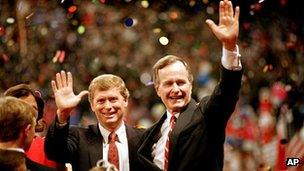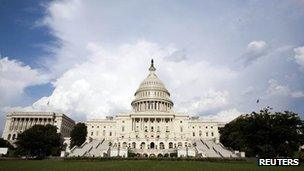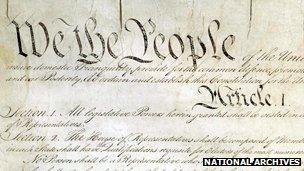Glossary: US elections
- Published
What is the difference between Medicare and Medicaid? What are blue dogs and red states? These are just a few of the many well-used but often misunderstood terms in US politics.
A-C
A
Air war The battle between candidates to get as much advertising on television and radio as possible. In recent years, online adverts, which are cheaper and can be more carefully targeted, have grown increasingly important.
B
Balancing the ticket When the presidential candidate chooses a vice-presidential candidate whose qualities balance out the nominee's perceived weaknesses. So for example, in 2008, Barack Obama, seen as young and relatively inexperienced, selected veteran Senator Joe Biden as his running mate.

Balance on the 1988 Republican ticket: Young, handsome Dan Quayle with George Bush Sr
Ballot initiative A procedure allowed in a number of states under which citizens are able to propose a change in the law.
If the initiative's backers can gather enough signatures, the proposed change is put to the voters in a referendum. If it is approved by the voters it then becomes law.
Ballot initiatives are sometimes referred to as ballot measures or propositions.
Battleground state A large state with an electorate split relatively evenly between Democrats and Republicans, so named because candidates spend a disproportionate amount of time and money campaigning there.
Traditional battleground states include Florida, Ohio and Pennsylvania, which have 29, 18 and 20 electoral votes, respectively.
Bellwether state A state that historically tends to vote for the winning candidate, perhaps because it is, demographically, a microcosm of the country as a whole.
Good examples are Missouri, which has voted for the winner in every US presidential election since 1904, except for 1956 and 2008, and Ohio, which in the same period picked the winner every election except 1944 and 1960.
The term derives from the name for a sheep which shepherds would fit with a bell. By listening out for this sheep, the bellwether, shepherds were able to locate the position of the entire flock.
Beltway An American term for the orbital highway or ring-road that often surrounds major cities. In political reporting, the term refers to business undertaken inside the Interstate 495 highway surrounding Washington DC.
A beltway issue is a political issue or debate considered to be of importance only to the political and media class and of little interest to the general public. Those considered to have a beltway mentality are seen as being out of touch with the ordinary voters.
Bill of rights The collective term for the first 10 amendments to the US constitution, external establishing the fundamental rights of individual citizens.
The amendments act as a mutually reinforcing set of rights and limit the powers of federal and state governments. Acts of Congress or laws ruled to be in conflict with these rights are deemed unconstitutional and may be declared void by the US Supreme Court.
The framers of the US constitution added the Bill of Rights in part because few individual rights were specified in the main body of the constitution.
Blue dog A fiscally conservative Democrat, often from a Republican-leaning state.
The name is a reference to the so-called "yellow dog Democrats" - fiercely loyal southern Democrats who would vote for the party's candidate even if it were a yellow dog.
Blue state A state where people tend to vote for the Democratic Party.
Bundler A person who gathers ("bundles") campaign contributions to a candidate from his or her network of friends and business associates.
Bundlers, who are often wealthy and well-connected, play a crucial role in contemporary campaign finance.
Individuals are barred by federal law from donating more than $2,500 (£1,603) per election to a candidate. But they can increase their influence by providing to the candidate cheques they have solicited from their associates and acquaintances.
The elite bundlers for President George W Bush's 2000 and 2004 campaigns were dubbed Rangers and Pioneers, a mark of their status.
C
Capitol The seat of Congress in Washington DC.

About 30,000 people work in the Capitol building and surrounding Capitol Hill
Constructed largely of white marble, it is home to both the Senate and House of Representatives.
The steps of the Capitol building are traditionally the stage for the inauguration of presidents on the 20 January following an election year.
Caucus A meeting of party members and activists at which they choose which candidate to back for the party nomination.
A scene from a Democratic caucus in Des Moines, Iowa in 2004.
In procedures that vary by state and party, participants in presidential caucuses meet in their local communities to choose which candidates they want to support.
The caucuses allocate delegates based on the level of that support. The results are then tallied state-wide, and the candidate with the most delegates is said to win the state.
Critics of the caucus system argue that its laborious nature tends to mean it is dominated by political activists whose preferences may not reflect those of the broader electorate.
Just under a dozen states use the system - the number is different according to party.
The most important party caucuses in recent years have been in Iowa.
In 2008, Mr Obama's victory in the Iowa caucuses - he won the most delegates - cemented his status as a serious contender for the Democratic nomination. It helped show Democrats elsewhere in the country that he could secure backing from white rural voters.
Citizens United A 2010 Supreme Court ruling , externalthat overturned restrictions on corporate spending in political campaigns.
In the 5-4 decision, the court equated corporations' right to spend money to influence an election with the right to free speech held by individuals under the First Amendment to the US constitution.
It overturned a ban on corporate and union spending on electioneering communications - that is, so-called issue ads broadcast within 60 days of a general election (or 30 days for primary elections) which explicitly mention the name of a candidate.
It means unions and corporations will be able to directly advertise, right up until election day, as long as they haven't co-ordinated their advertisements with a candidate's campaign.
Commander in chief The constitutional role granted to the president as head of the United States' armed forces.
Congress The legislative branch of the US government as prescribed in Article I of the US constitution, external.
It is made up of two houses - the 435-member House of Representatives and 100-member Senate - each of which officially has equal power, if not prestige.
A congressional period lasts two years (or sessions) and begins at noon on 3 January of odd-numbered years.
As well as drafting and implementing laws, Congress can also:
Investigate matters of public concern
Oversee federal agencies and their programmes
Declare war
Approve and ratify treaties
Regulate commerce
Increase and decrease taxes
Print and appropriate money
Confirm/approve judicial and federal appointments and nominations
Impeach federal officials including the president and vice-president
Override presidential vetoes based on a two-thirds majority in each chamber.

The original copy of the constitution is on display at the National Archives in Washington DC
Congressman/woman A member of the House of Representatives, typically. The term can refer to a member of the Senate.
Constitution of the United States The fundamental and founding law of the US federal system of government.
The US constitution, external and its 27 amendments establish the principal organs of government, their roles, and the basic rights of citizens.
It is upheld as the supreme law of the land, meaning all federal and state laws, executive actions and judicial decisions must be consistent with it.
The US constitution was ratified in 1788, and was most recently amended in 1992. It is the oldest written national constitution in effect.